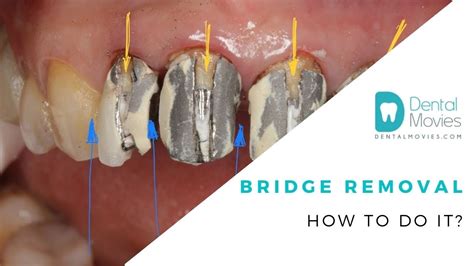How To Remove A Dental Bridge At Home
Ronan Farrow
Apr 02, 2025 · 2 min read

Table of Contents
How to Remove a Dental Bridge at Home? (A Comprehensive Guide)
It's crucial to understand that removing a dental bridge at home is generally not recommended. Dental bridges are complex prosthetic devices, and improper removal can lead to serious oral health issues. This guide provides information for educational purposes only and should not be considered a substitute for professional dental advice. Always consult your dentist before attempting any home remedies related to your dental bridge.
Understanding Your Dental Bridge
Before we delve into the (highly discouraged) idea of home removal, let's understand what a dental bridge is. A dental bridge is a prosthetic device used to replace one or more missing teeth. It consists of artificial teeth (pontics) that are anchored to the adjacent natural teeth (abutments) using crowns. The entire structure is cemented into place, providing a stable and functional replacement for the missing teeth.
Why You Shouldn't Attempt Home Removal
Attempting to remove your dental bridge at home carries significant risks:
- Damage to the Bridge: Improper force can break or crack the bridge, rendering it unusable. This will necessitate a more complex and potentially costly repair or replacement.
- Damage to Your Teeth: Applying excessive force can damage your natural teeth, leading to chipping, cracking, or even loosening of the abutment teeth. This could require extensive dental work, including fillings, crowns, or even root canals.
- Gum Irritation and Infection: Forceful removal can irritate and injure your gums, creating a breeding ground for bacteria and leading to infection.
- Loss of the Bridge: If the bridge becomes dislodged and swallowed or inhaled, it's a serious medical emergency requiring immediate medical attention.
In short, the potential risks far outweigh any perceived benefits of attempting home removal.
When to See Your Dentist Regarding Your Bridge
There are instances where you should contact your dentist immediately:
- Loose Bridge: If you notice your bridge feeling loose or shifting, contact your dentist immediately.
- Broken Bridge: If any part of your bridge breaks or cracks, contact your dentist immediately.
- Pain or Discomfort: If you experience pain, discomfort, or swelling around your bridge, seek dental attention promptly.
- Food Impaction: If you consistently experience food impaction under your bridge, it’s vital to see your dentist.
- Cement Leakage: If you notice any cement leaking from under your bridge, contact your dentist as soon as possible.
Maintaining Your Dental Bridge
Proper care is essential to prolong the lifespan of your dental bridge:
- Regular Brushing and Flossing: Maintain excellent oral hygiene practices, including brushing twice daily and flossing carefully to remove food particles and plaque.
- Dental Checkups: Attend regular dental checkups to monitor the condition of your bridge and address any potential issues early on.
- Avoid Hard Foods: Refrain from biting into excessively hard foods that could damage the bridge.
Remember, your dental health is paramount. Always prioritize professional dental care. Contact your dentist for any concerns or issues related to your dental bridge. Do not attempt to remove your dental bridge at home.
Featured Posts
Also read the following articles
| Article Title | Date |
|---|---|
| How To Train Your Dragon Motorcycle Helmet | Apr 02, 2025 |
| How To Tell Fake Prada Sunglasses | Apr 02, 2025 |
| How To Set Up A Saltwater Pool | Apr 02, 2025 |
| How To Test Motorcycle Starter Motor | Apr 02, 2025 |
| How To Store Vintage Clothing | Apr 02, 2025 |
Latest Posts
-
How Big Of A Blackstone Do I Need
Apr 03, 2025
-
How Big Is The Bed On A Jeep Gladiator
Apr 03, 2025
-
How Big Is St Lucia Compared To A Us State
Apr 03, 2025
-
How Big Is Rt 44 At Sonic
Apr 03, 2025
-
How Big Is North Korea Compared To Texas
Apr 03, 2025
Thank you for visiting our website which covers about How To Remove A Dental Bridge At Home . We hope the information provided has been useful to you. Feel free to contact us if you have any questions or need further assistance. See you next time and don't miss to bookmark.
